Languages
240 different ways to spell the word Scissors
The author of this pamphlet, published in England in 1829, noted that he could expand the list to 480 variant spellings if he were to substitute 'z' for 's' at the end of the word. On this basis, he claimed that "The word Scissars appears capable of more variations in the spelling than any other."He seemed to prefer the spelling 'scissars' to 'scissors'.
He also seemed to think that the publication of this list offered some kind of moral lesson. But, despite his explanation, I still can't figure out what that lesson might be:
If engaged in writing for the amusement of the Public and cannot refrain from introducing subjects which may be prejudicial to the morals of the rising generation, had he not much better write nothing but Scissers...
If any other subject engage his attention, it will always be a very safe and adviseable plan to consider if at any future more serious moment he might not be inclined to wish he had written nothing but Scissurs.
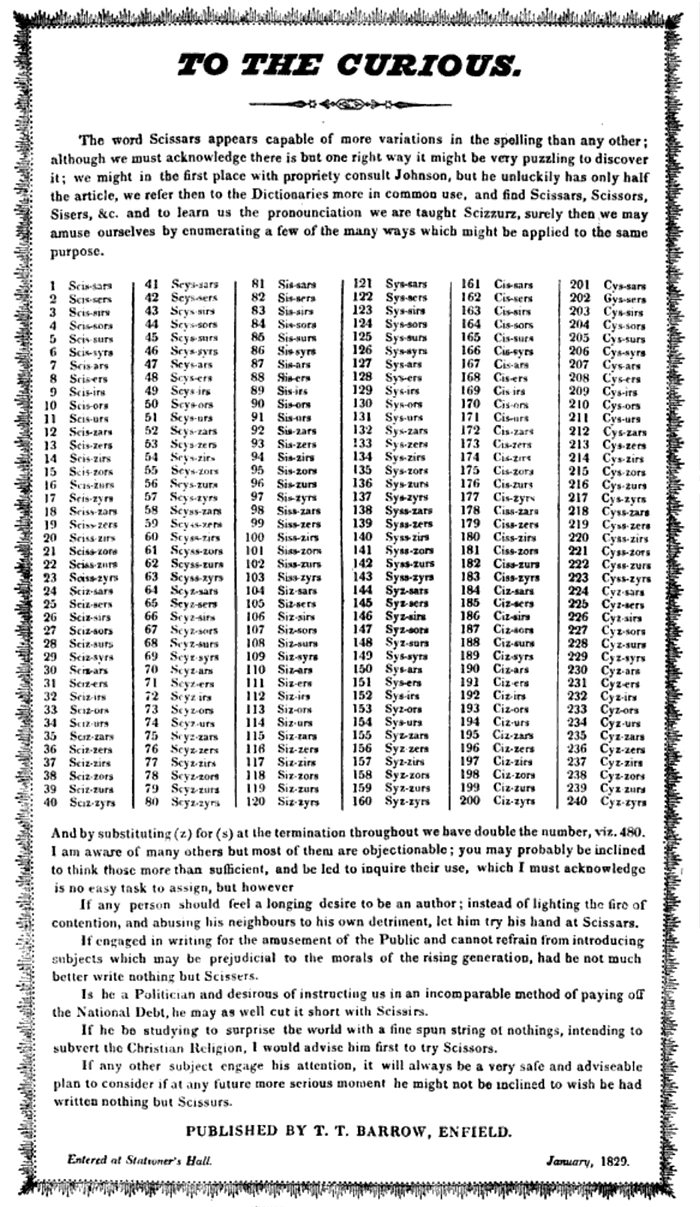
Click to enlarge. Source: The Picture Magazine - 1895
Posted By: Alex - Mon Apr 26, 2021 -
Comments (0)
Category: Languages, Puns and Other Wordplay, Nineteenth Century
Morse Code for Drivers
In 1960, the Automobile Legal Association proposed that all drivers should learn a code that would allow them to communicate with each other on the road via honks.One short honk would mean, 'Left blinker going'. Three short honks would mean, 'A light burned out'. One long honk would mean, 'Get over in the right lane.' And so on.
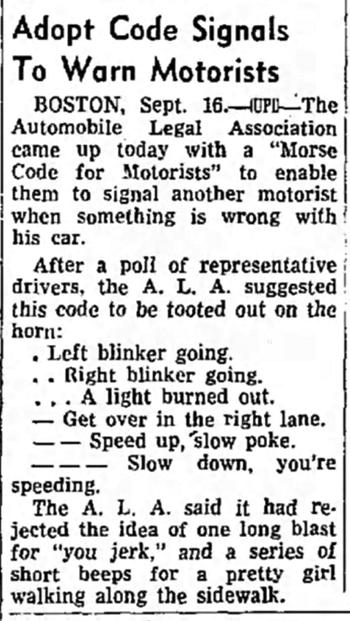
The Terre Haute Star - Sep 17, 1960
Although the honking code never caught on, the idea of allowing drivers to communicate with each other has persisted. The 21st-century spin on it are the various phone apps (such as bump.com, Driver Talk, or PL8chat) that allow you to send messages to other cars by entering their license plate number. Of course, both drivers have to be signed up with the app for this to work. Which means these apps have, for now, very limited practical use.
Posted By: Alex - Mon Feb 15, 2021 -
Comments (3)
Category: Languages, Cars
Dyr bul shchyl
The Russian artist Alexei Kruchenykh invented the Zaum language in 1913. He described it as "a language which does not have any definite meaning." From what I can gather, it was gibberish sounds strung together.Dyr bul shchyl, also written by Kruchenykh, was the first (but not last) poem written in Zaum.
ubeshshchur
skum
vy so bu
r l ez
You can hear Kruchenykh reading the poem aloud in the first clip. There's a more modern interpretation of it below.
Knowing Russian, or any other language, won't help you understand the poem. But according to Russian language expert Lucas Stratton, "critics have interpreted Dyr bul shchyl as an arrangement of sounds associated with a coming storm."
Posted By: Alex - Sun Nov 29, 2020 -
Comments (0)
Category: Languages, Poetry, 1910s, Cacophony, Dissonance, White Noise and Other Sonic Assaults
The Language of Deseret
I was unaware that Brigham Young created a new alphabet for his followers. "However, the alphabet failed to gain wide acceptance and was not actively promoted after 1869."Here is a page at the official Mormon site that tells of it.
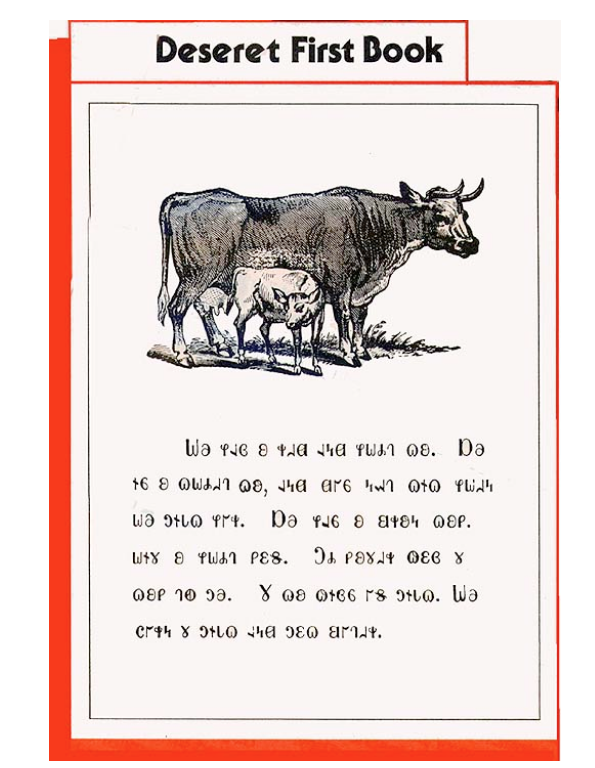
Here is an encyclopedia entry with the full alphabet.
Posted By: Paul - Sun Nov 29, 2020 -
Comments (5)
Category: Eccentrics, Inventions, Languages, Religion, Nineteenth Century
A Horse with No Name in Latin
Posted By: Paul - Tue Oct 27, 2020 -
Comments (2)
Category: Animals, Humor, Parody, Languages, Music, 1970s
Unicorn Hunters
In 1976, a group at Lake Superior State University, calling itself the 'Unicorn Hunters,' released a "banished word list" that cataloged words they felt should be banished from the English language "for Misuse, Overuse and General Uselessness." Every year since then this group has released an updated new list. Words and phrases for 2020 include 'Quid pro quo,' 'Artisanal,' and 'Mouthfeel'.'Unicorn Hunters' is an odd name, and as far as I can tell, the origin of the name had nothing to do with the banished word list. It was invented by Wilmer T. Rabe, the public relations director at LSSU, who felt the school needed to let people know it was about more than just engineering. (It was best known, at the time, as a feeder school for Michigan Technical University). More info from the Des Moines Tribune (Aug 2, 1976):
"From there," says Rabe, "it kind of just grew and began to embrace more and more things."
Loosely put, unicornism — Lake Superior State style — is an abstraction seemingly devoted to the pursuit of joy.
Conglomerate stationery explains: "The Hunters are dedicated to the proposition that every man has a unicorn which he is predestined to hunt. It is not necessary that he actually find or slay this unicorn, merely that he diligently seek it."
To this day, you can still download a Unicorn Hunting License from the school's website. The Banished Word List was one of the ideas created by this group.
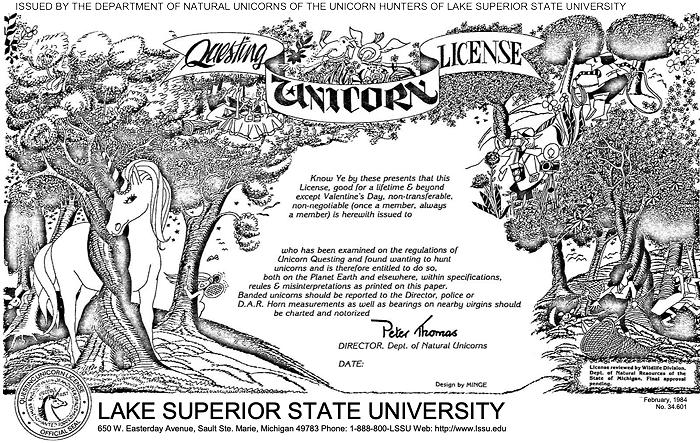
The irony is that, in recent years, the term 'Unicorn Hunters' has come to acquire a very different meaning. Googling the term now brings up this definition:
Maybe it's time for LSSU to add 'Unicorn Hunters' to its banished word list.
Posted By: Alex - Fri Oct 23, 2020 -
Comments (2)
Category: Languages, 1970s
Pronouncing the Scientific Names of Seashells of North America
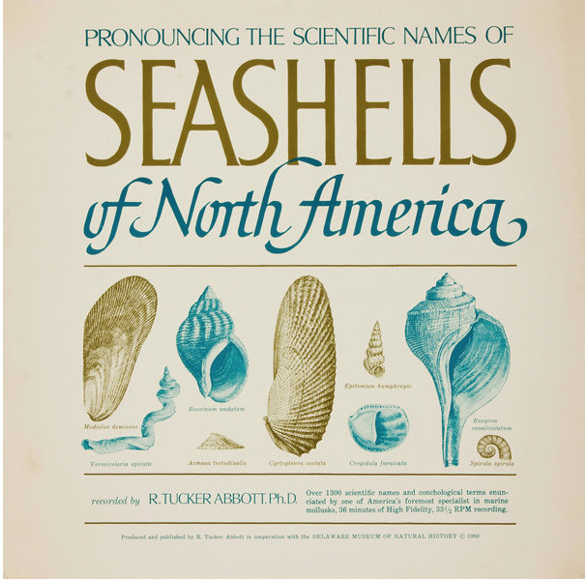
You can download the MP3 files here. Note: clicking the link does not initiate the download. You choose to do so at the new page.
R. Tucker Abbott begins with a statement sure to dissuade us from listening further. "Actually, there are no official correct pronunciations of these Latin names..."
Source.
Posted By: Paul - Tue Jul 28, 2020 -
Comments (2)
Category: Boredom, Languages, Nature, Oceans and Maritime Pursuits, 1960s
“Oh, it was my cruel parents who first did me trepan”
To trepan means to perforate the skull with a drill. Which makes the title of this old folk song from Norwich extremely odd.However, the song itself isn't actually about parents drilling a hole in the skull of their child, despite the title. Turns out, 'trepan' has another, archaic meaning, which is to trap or ensnare, and that's how it's used here.
But even though it isn't about pediatric brain surgery, it's still quite a dark and violent song.
It's performed below by Jon Wilks. He starts singing the song about halfway through the clip.
They married me to an old man for the sake of money and land.
If they'd married me to a young man without a penny at all,
He'd have took me in his arms and have loved me all the more.
Oh, it's, "Hush, my dearest Nancy, oh, wait 'til we go to town,
I'll buy you a lady's bonney, likewise a mus-e-lin gown;
There is no lady in the land your beauty can compare,
And I'll buy you a little lapdog to follow you everywhere."
"I want none of your little lapdogs nor none of your gentle care;
It's a pity that such an old man my beauty you should snare.
I am not sixteen years of age and scarcely in my bloom;
Oh, you are my cruel torment, both morning, night and noon."
When he comes to bed at night he's as cold as any clay:
His feet are as cold at midnight as corpse, I've heard them say;
His pipes are out of order and his old flute's never in tune:
Oh, I wish that he was dead and a young man in the room.
[Now some they do persuade me to drown him in a well,
And others do persuade me to grind him in a mill.
I'd rather take my own advice and tie him to a stake,]
Oh I'll get a big stick and labour him well, until his bones I break.
Source of lyrics
Posted By: Alex - Fri Jun 26, 2020 -
Comments (1)
Category: Languages, Music
Informative Swimwear
In 2005, Robert Dickey and Ruth Stephens filed a patent application for "swimwear as information device." Their idea was to make a line of swimwear that displayed maritime signal flags. This would allow people to communicate messages to those around them via their swimwear. They explained:The possible messages one could send seemed limitless, but they were never granted a patent. Perhaps the idea of messages on clothing was deemed too obvious.
There's also the limitation that only people conversant with maritime signal flags could decode the messages, which would make the various 'stay away' messages somewhat pointless.
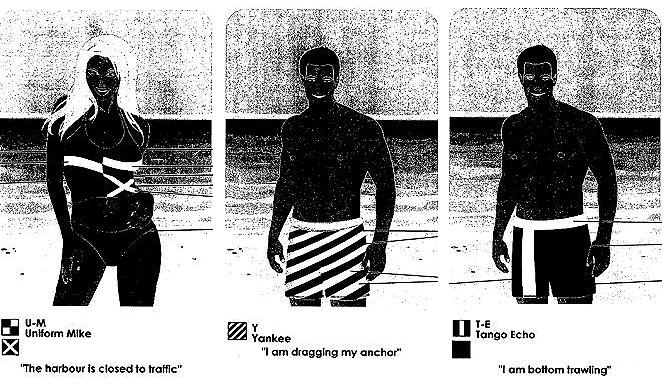
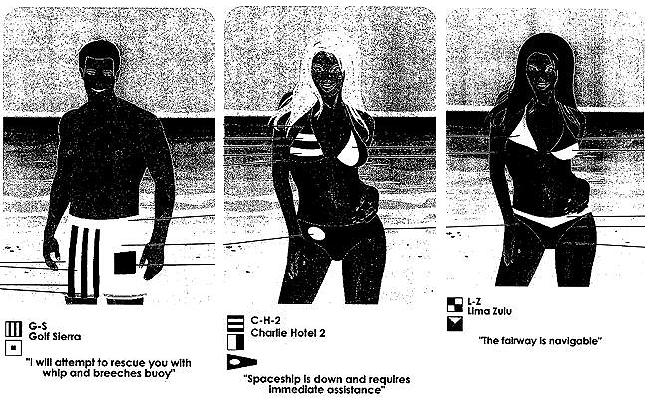

Posted By: Alex - Sun Apr 26, 2020 -
Comments (3)
Category: Boats, Fashion, Inventions, Patents, Languages, Double Entendres and Nudge-Nudge, Wink-Wink
Augmented Roman
Augmented Roman was one of the periodic attempts to improve and rationalize the English alphabet. Introduced in the 1960s by Sir James Pitman, the idea was to expand the alphabet from 26 letters to 43, and to have each letter represent a single, distinct sound. Unlike the current alphabet in which letters can have different sounds depending on context.Proponents of Augmented Roman imagined teaching children to read using this improved alphabet, and then having the kids switch over to the standard alphabet later. And that's where the plan ran aground, because most people figured that if kids have to learn the standard alphabet anyway, just teach them that from the beginning.
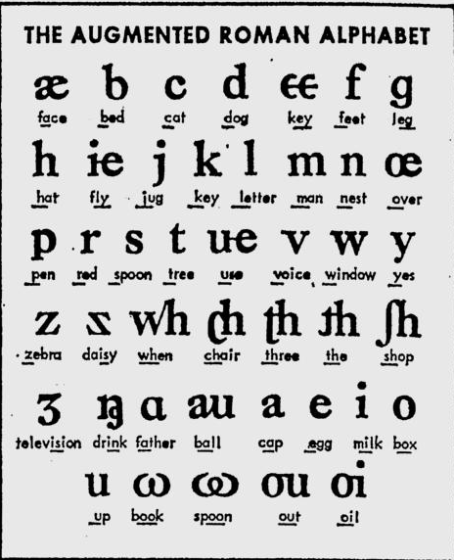
image source: omnivorenz

Tampa Bay Times - Sep 2, 1962
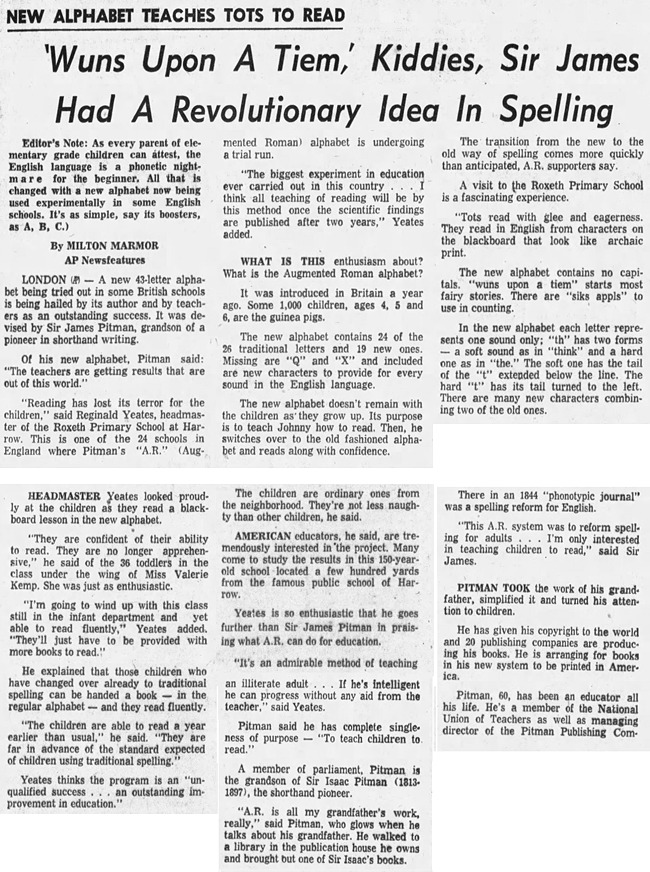
Tampa Bay Times - Sep 2, 1962
Posted By: Alex - Fri Oct 25, 2019 -
Comments (7)
Category: Education, Languages, 1960s

| Who We Are |
|---|
| Alex Boese Alex is the creator and curator of the Museum of Hoaxes. He's also the author of various weird, non-fiction, science-themed books such as Elephants on Acid and Psychedelic Apes. Paul Di Filippo Paul has been paid to put weird ideas into fictional form for over thirty years, in his career as a noted science fiction writer. He has recently begun blogging on many curious topics with three fellow writers at The Inferior 4+1. Contact Us |




